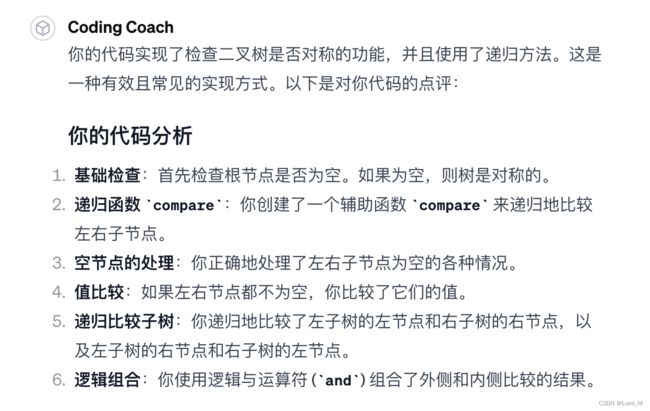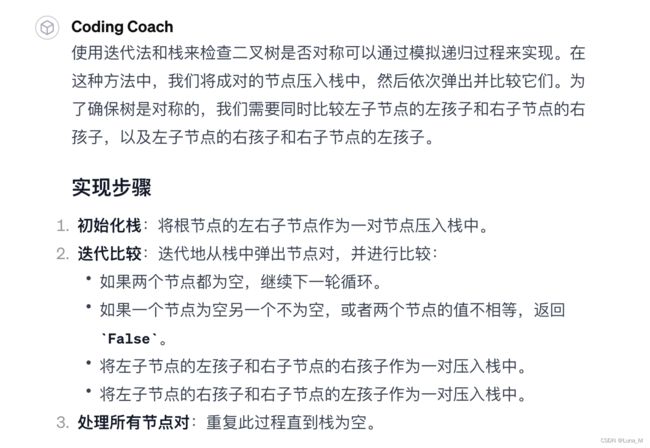python coding with ChatGPT 打卡第15天| 二叉树:翻转二叉树、对称二叉树
相关推荐
python coding with ChatGPT 打卡第12天| 二叉树:理论基础
python coding with ChatGPT 打卡第13天| 二叉树的深度优先遍历
python coding with ChatGPT 打卡第14天| 二叉树的广度优先遍历
文章目录
- 翻转二叉树
-
- Key Points
- 相关题目
- 视频讲解
- 重点分析
-
- 递归遍历
- 层序遍历
- 对称二叉树
-
- Key Points
- 相关题目
- 视频讲解
- 重点分析
-
- 递归法
- 迭代法
- 衍生题目
-
- 相同的树
-
- 递归法
- 迭代法
- 另一个树的子树
翻转二叉树
Key Points
- 只要把
每个节点的左右孩子翻转一下,就可以达到整体翻转的效果 - 可选择深度优先遍历(递归遍历)或广度优先遍历(层序遍历)
相关题目
226. 翻转二叉树
视频讲解
翻转二叉树
重点分析
递归遍历
前序:
def invertTreePreOrder(root):
if not root:
return None
root.left, root.right = root.right, root.left
invertTreePreOrder(root.left)
invertTreePreOrder(root.right)
return root
中序:
def invertTreeInOrder(root):
if not root:
return None
invertTreeInOrder(root.left)
root.left, root.right = root.right, root.left
invertTreeInOrder(root.left) # 注意:这里应该再次调用左子树
return root
在中序遍历中,我们先递归地处理左子树,然后交换当前节点的左右子节点,最后处理右子树。注意,由于我们在交换后再递归右子树,实际上我们需要两次递归左子树。
中序 法2:
def invertTree(root):
if not root:
return root
right = root.right # 先把右子树存起来
# 左
invertTree(root.left)
# 根
root.left, root.right = root.right, root.left
# 右
invertTree(right)
return root
后序:
def invertTreePostOrder(root):
if not root:
return None
invertTreePostOrder(root.left)
invertTreePostOrder(root.right)
root.left, root.right = root.right, root.left
return root
层序遍历
def inverTree(root):
if not root:
return root
queque_record = [root]
while queque_record:
node = queque_record.pop(0)
node.left, node.right = node.right, node.left # 这里不管是先翻转左右节点还是先加入左右节点都可以
if node.left:
queque_record.append(node.left)
if node.right:
queque_record.append(node.right)
return root
在实现迭代法的过程中,有同学问了:递归与迭代究竟谁优谁劣呢?
从时间复杂度上其实迭代法和递归法差不多(在不考虑函数调用开销和函数调用产生的堆栈开销),但是空间复杂度上,递归开销会大一些,因为递归需要系统堆栈存参数返回值等等。
递归更容易让程序员理解,但收敛不好,容易栈溢出。
这么说吧,递归是方便了程序员,难为了机器(各种保存参数,各种进栈出栈)。
在实际项目开发的过程中我们是要尽量避免递归!因为项目代码参数、调用关系都比较复杂,不容易控制递归深度,甚至会栈溢出。
对称二叉树
Key Points
二叉树类的题目,确定遍历顺序非常重要
相关题目
101. 对称二叉树
视频讲解
同时操作两个二叉树
重点分析
递归法
def isSymmetric(root):
if not root:
return True
return compare(root.left, root.right)
def compare(left, right):
if not left and not right:
return True
if not left:
return False
if not right:
return False
if left.val != right.val:
return False
con1 = compare(left.left, right.right)
con2 = compare(left.right, right.left)
if con1 and con2:
return True
return False
迭代法
使用栈
def isSymmetric(root):
if not root:
return True
stack_record = [(root.left, root.right)]
while stack_record:
left, right = stack_record.pop()
if not left and not right:
continue # 不能直接return True
if not left:
return False
if not right:
return False
if left.val != right.val:
return False
stack_record.append([left.left, right.right])
stack_record.append([left.right, right.left])
return True
使用队列:
def isSymmetric(root):
if not root:
return True
queue_record = [(root.left, root.right)]
while queue_record:
left, right = queue_record.pop(0)
if not left and not right:
continue # 不能直接return True
if not left:
return False
if not right:
return False
if left.val != right.val:
return False
queue_record.append([left.left, right.right])
queue_record.append([left.right, right.left])
return True
衍生题目
相同的树
100. 相同的树
递归法
def isSameTree(p, q):
if not p and not q:
return True
if not p:
return False
if not q:
return False
if p.val != q.val:
return False
con1 = isSameTree(p.left, q.left)
con2 = isSameTree(p.right, q.right)
if con1 and con2:
return True
return False
迭代法
def isSameTree(p, q):
stack_record = [(p,q)]
while stack_record:
node1, node2 = stack_record.pop()
if not node1 and not node2:
continue # 这里不能直接return True 要继续比较stack里的其他节点
if not node1:
return False
if not node2:
return False
if node1.val != node2.val:
return False
stack_record.append((node1.left, node2.left))
stack_record.append((node1.right, node2.right))
return True
另一个树的子树
572. 另一个树的子树
def isSubtree(root, subRoot):
stack_record = [root]
while stack_record:
node = stack_record.pop()
if isSameTree(node, subRoot):
return True
if node.left:
stack_record.append(node.left)
if node.right:
stack_record.append(node.right)
return False


